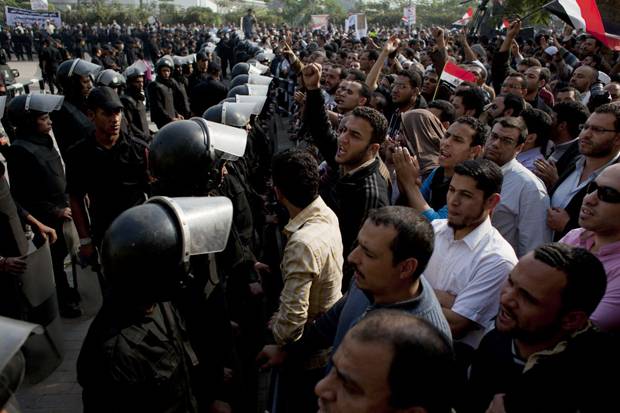
What has caused the latest crisis?
Muhammed Mursi, Egyptian president since June 2012 issued a presidential decree on 22 November that limited the powers of the judiciary as the president’s decisions were “final and unchallengeable by any individual or body until a new constitution has been ratified and a new parliament has been elected.” This led to a tense standoff between the secular opposition that lost in the last election. The replacement of public prosecutor, Abdel Maguid Mahmoud, widely criticised for failing to win stronger prison sentences against former President Hosni Mubarak and his associates, led most of the judiciary to strike in protest. As judicial personnel supervise voting at polling stations, this puts in jeopardy the referendum on Mursi’s constitution vote on December 15.
There have been violent clashes on the streets of Cairo, including the ransacking of the Muslim Brotherhoods headquarters and the presidential palace. The parliamentary elections in June 2012 led to 75% of the seats going to the Muslim Brotherhood (MB) and the Nour party. The secular parties failed miserably. The current protests are being led by the secular groups which lost out in the initial parliamentary elections. These groups have little support even though they were able to harness social media very well, but they have now taken Mursi’s sweeping power attempt to take to the streets. They have attempted to gain concessions from Mursi.
What has the role of the new constitution played in the crisis?
Mursi emerged victorious and became head of state over the Mubarak era constitution and system. He has since attempted to consolidate his position and introducing a new constitution has been the centre piece of this attempt. He however faces stiff opposition to anything that appears to empower the President. The judiciary dissolved parliament under a technicality and then outlawed the constituent assembly tasked with writing the constitution. The current constitutional crisis has emboldened Mursi’s opponents who see an opportunity to weaken him and gain concessions by undermining his rule.
How much influence does the judiciary have?
The judiciary and Mursi have been at loggerheads since he became President. Prior to becoming President, the MB Freedom and Justice Party (FJP) won half of the seats in parliament. The Supreme Administrative Court, stacked with judges from the Hosni Mubarak era, has a history of bogus rulings. What emboldened the Mubarak era judges was the armies’ silent but implicit support of their judgments. With the judiciary constantly ruling against the executive, this keeps them relevant in a changing Egyptian landscape.
What has been the role of the army?
The army’s interference in the running of the country and disproportionate influence weakens the president. The army since the ouster of Mubarak has ensured the day-to-day running of the country is in the hands of the government, but kept foreign policy firmly within its own hands. The military has remained on the sidelines and refrained from assisting Mursi. Even as the demonstrations turned increasingly violent the army did little and merely said it is on the side of the people. The army thus contributed the weakening of Mursi by standing by when the presidential palace and the MB headquarters were attacked.
Will Mohammed Mursi survive the crisis?
0n the 10 December 2012 Muhammed Mursi reversed the powers he introduced by presidential decree as a concession to the opposition. The referendum on the constitution is still scheduled to go ahead and if it does Mursi will in all likelihood will secure enough votes to make the new constitution the official one. Whilst the global media coverage has given the opposition much coverage, Muhammed Mursi has wide support in the country as many more have come on the streets to support the Muslim Brotherhood than those supporting the secularists, and the wider opposition.
What does the opposition really want?
The National Salvation Front, the main opposition coalition has stated that it was protesting at Mursi’s attempt to give himself the powers Mubarak had. They took to the streets and have continued in their call against Mursi and his constitution; emphasising their opposition to some of its Islamic aspects. Mursi invited the opposition to take part in discussions on 7 December 2012 which was rejected. As Mursi caved-in and reversed his edict, bizarrely the opposition leadership, condemned Mursi for doing exactly what they have demanded, saying it was unacceptable, and calling for yet more protests. Opposition leaders say that withdrawing the edict is a trick attempted to distract from the “real goals,” and say the public needs to continue to protest against “a president who ignores his people.” In reality the opposition that failed miserably in the elections is working to undermine his rule and would like to emerge in positions of power from this latest crisis.
